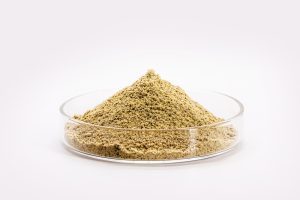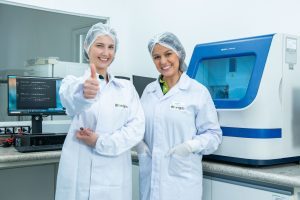Pet owners are increasingly concerned about the well-being and health of their animals, especially when it comes to obesity in dogs and cats. In the United States, for instance, 59% of dogs and 61% of cats are classified as overweight or obese¹.
Just as in humans, excess body fat has severe negative impacts on pets’ health and is linked to diseases such as diabetes, osteoarthritis, hypertension, and even certain types of cancer.
Among the leading causes of being overweight are owners who give in to their pets’ requests and/or choose inappropriate diets lacking essential nutrients. This behavior is tied to the growing humanization of pets: in Brazil, 92% of pet owners consider their animals family members².
Another significant factor is the emotional dependence of owners on their pets, which provides numerous benefits to humans, such as reducing stress and anxiety, preventing heart disease, supporting longer lives, and much more! In light of this, ensuring that we also provide well-being to our four-legged companions is essential.
Therefore, it is crucial to promote behavioral changes among pet owners, encouraging balanced diets and the selection of foods made with natural-origin ingredients designed to prioritize the health and well-being of pets.
How to promote pet well-being through nutrition
Many pet owners fail to recognize excess weight in their companions, highlighting the need for greater awareness.
Various factors influence pet obesity, including breed, genetics, age, spaying or neutering, eating habits, and lack of exercise. Additionally, owners’ choices directly impact their pets’ health, as a pet’s lifestyle often mirrors its owner’s.
Another significant aspect is the habit of some owners believing that overfeeding is a way of showing love. This practice can be harmful, and many fail to recognize the risks. According to Mintel data, 20% of argentine pet owners feed their pets table scraps³, which can contribute to weight gain.
In most cases, preventing or combating pet obesity is no mystery. The key is to balance calorie intake and energy expenditure—combining a proper diet with exercise and regular veterinary visits.
Diet management and consistent monitoring throughout a pet’s life stages are crucial in preventing excess weight. However, nutrition extends beyond portion control: selecting high-quality and appropriate ingredients for pet food formulations is essential.
Some pet owners are becoming more aware of the importance of caring for their animals’ health. In the UK, 39% of pet food consumers believe their pets would benefit from losing weight⁴. In China, 84% of owners are willing to manage their pets’ weight to prevent harmful diseases⁴. This reflects a growing sense of responsibility for the health and well-being of pets.
Challenges in the pet food market: how Biorigin additives make a difference
Social, cultural, and economic changes also impact the behavior of pet owners, who are increasingly concerned with improving the quality of life of their four-legged companions.
Recognizing the importance of caring for animal health, the demand for more advanced nutritional solutions is growing. According to Mintel reports, 33% of pet owners in China believe that food products enriched with functional ingredients would be a sufficient incentive to pay more⁵.
Meanwhile, 37% of U.S. consumers who purchase pet food or treats say they want options that help manage pet weight⁴.
Pet food brands must actively combat obesity by developing products rich in fiber, low in fat, and containing additives that can contribute to satiety and overall health improvement. These foods can effectively manage the weight of dogs and cats and aid in healthy weight loss.
The ingredient industry also plays a crucial role in this process by developing and studying ingredients to understand the role of each molecule and their synergy. This analysis allows for identifying effective combinations that promote both weight loss and pets’ overall health.
Several additives can be incorporated into dog and cat food to maintain and lose weight. Below are some of the most common ones:
- Soluble and Insoluble Fiber: Helps increase feelings of fullness and improves gut health. Examples include yeast beta glucan, beet pulp, and cellulose
- L-Carnitine: An amino acid that aids in converting fat into energy, promoting body fat loss.
- Omega-3 Fatty Acids: These are found in fish oil, help reduce inflammation, and may improve metabolic health.
- Prebiotics and Probiotics: Promote a healthy microbiome, benefiting gut health and helping with weight regulation.
- Green Tea Extract: Contains catechins that may increase metabolism and aid in fat burning.
These additives are often included in foods specifically formulated for weight management. However, it is essential to consult a veterinarian before changing your pet’s diet, ensuring that your pet is receiving the right nutrition for their specific needs.
Another highlight is the growing interest in foods that promote digestive health, with ingredients such as probiotics and prebiotics. In addition, low-calorie formulations that promote satiety are ideal for providing greater well-being.
Prebiotic additives can aid weight loss in several ways, mainly by promoting a favorable environment for beneficial bacteria in the intestine. The following are the main mechanisms of action:
- Balance of the Intestinal Microbiota: prebiotics are non-digestible fibers that feed the beneficial bacteria in the intestine, helping to maintain a healthy balance of the intestinal microbiota. A balanced microbiome can improve digestion and metabolism.
- Reduced Fat Absorption: Studies suggest that prebiotics may reduce the absorption of fat from food, increasing its excretion in the feces.
- Production of Short-Chain Fatty Acids (SCFA): Prebiotics stimulate the production of SCFA, which may positively influence energy metabolism and appetite regulation.
- Modulation of Appetite: By improving gut health, prebiotics may help regulate appetite-related hormones such as ghrelin and leptin, contributing to a more prolonged feeling of fullness.
- Reduced Inflammation: A healthy microbiome may reduce systemic inflammation associated with weight gain and obesity.
Beta-glucan from yeast, in turn, also offers significant benefits for weight loss in dogs and cats, with effects similar to those observed in humans. See the main mechanisms:
- Feeling of Satiety: yeast beta-glucan forms a gel in the stomach of pets, delaying gastric emptying and prolonging the feeling of satiety, which contributes to reducing calorie intake.
- Appetite Regulation: yeast beta-glucan supplementation can increase levels of GLP-1, a hormone that helps regulate appetite and promote satiety.
- Blood Glucose Control: yeast beta-glucan can help stabilize blood glucose levels, which is beneficial for metabolic health and can contribute to weight loss.
- Reduction of Inflammation: with anti-inflammatory properties, yeast beta-glucan helps reduce systemic inflammation, often associated with obesity.
- Gut Health: Fermentation of yeast beta-glucan in the intestines of pets produces short-chain fatty acids, which have beneficial effects on gut health and can help regulate weight.
Incorporating foods or supplements rich in yeast beta glucan into your pet’s diet can be an effective strategy to support healthy weight loss. However, always consult a veterinarian before changing your pet’s diet, ensuring that your pet receives the appropriate nutrients for their specific needs.
Thaila Cristina Putarov, Global Business Manager for Animal Nutrition and Health at Biorigin, shares interesting insights into the pet market: “Obesity in dogs and cats is a growing challenge, and the use of prebiotic and immunomodulatory additives can be effective tools to promote a healthy intestinal microbiome and aid in weight management in a natural and sustainable way. In one of our studies, we were able to verify the positive effects of MacroGard on satiety and glycemic control in obese animals, in addition to contributing to the reduction of inflammation, which is an intrinsic condition of Obesity. Through our applied research, we seek to understand the effects of our products, considering doses and application methods so that the pet food industry can find solutions that work.”
Market trends show the need for innovative nutritional solutions. Biorigin stands out as the ideal partner to support the animal nutrition industry, adding value to products and promoting the health and well-being of dogs and cats with its natural-origin solutions!
Biorigin: an ally in pet health and weight control
For over 20 years, Biorigin has been developing natural ingredients that meet the demands of the pet food market. Our solutions contribute to intestinal health, strengthen immunity, and increase the attractiveness of food.
To promote the well-being and health of pets, especially in weight control and intestinal health, we offer innovative solutions developed with the quality and expertise that only Biorigin can provide:
- MACROGARD, extracted from the yeast Saccharomyces cerevisiae, is a scientific and commercial reference and has a minimum concentration of 60% beta-glucans, being the most studied and used source of yeast beta-glucan (1,3/1,6) in animal feed for maintaining health, performance, and well-being.
In addition, our product promotes health throughout the animal’s life, strengthening the immune system of pets, improving the vaccine response in puppies, helping with skin and fur health, maintaining joint health, and enhancing the metabolism of obese animals, such as reducing glucose levels.
- ACTIVEMOS is obtained from the yeast cell wall through a primary production process with pure culture. This exclusive technique allows the production of cells with a higher concentration of cell wall compounds, ensuring superior functionality.
Rich in mannan oligosaccharides (MOS), ActiveMOS acts as a substrate for the microbiota, stimulating the production of short-chain fatty acids essential for intestinal health. Its benefits include stimulating the growth of beneficial bacteria, balancing the intestinal microbiota through the agglutination of pathogens, and preserving the integrity of the intestinal barriers, promoting greater health and well-being.
- HYPERGEN, produced from the primary yeast fermentation process, is a second-generation MOS with enhanced prebiotic effects. It helps maintain proper intestinal function, promotes digestion and nutrient absorption, and plays an active role in intestinal defense.
The product promotes the preservation of intestinal integrity, better use of nutrients, modulation of the intestinal microbiota, and contributes to improving the quality of life of pets.
“At Biorigin, we deliver high-quality, naturally-derived ingredients derived from the yeast Saccharomyces cerevisiae, with full traceability throughout the production process. We combine specialized technical support and constant investment in research and innovation to offer the best solutions to the market. Our biotechnology applied to yeast production provides unparalleled benefits, such as customization and high nutritional quality. Products such as MacroGard, ActiveMOS, and HyperGen support the pet nutrition industry by delivering results that promote animal well-being. I invite you to discover how our solutions can transform your products and meet growing demands, including weight control, with the quality that only Biorigin offers,” says Letícia Pacheco, Research and Development Specialist at Biorigin.
For more information about Biorigin and our yeasts and yeast extracts, visit our website.
- Sources:
¹ Pet Obesity Prevention Association, 2022
² Mintel – Patent Insights: Revolutionizing the Future of Pet Food, 2024
³ Mintel – Pet Food in Latin America: Now, Then and Future, 2023
4 Mintel – Patent Insights: Innovations Shaping Pet Food, 2022
5 Mintel – A Year of Innovation in Pet Food and Products, 2024








